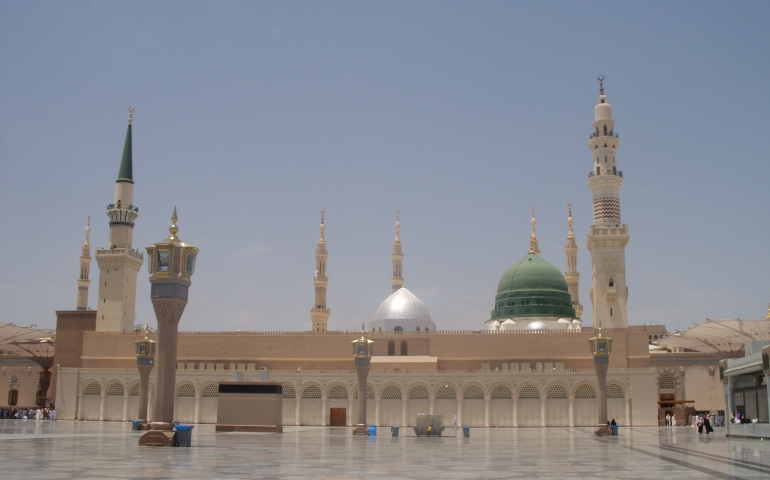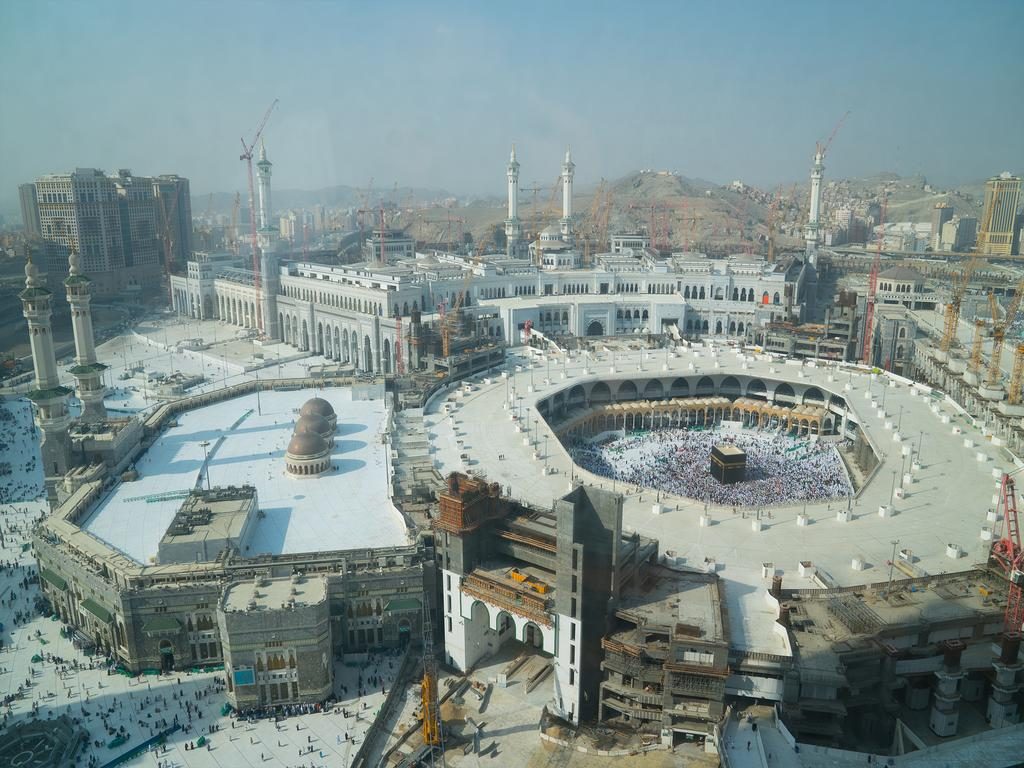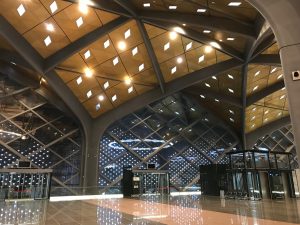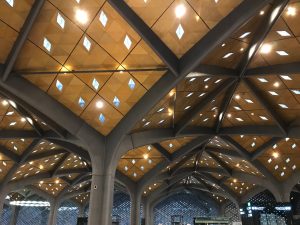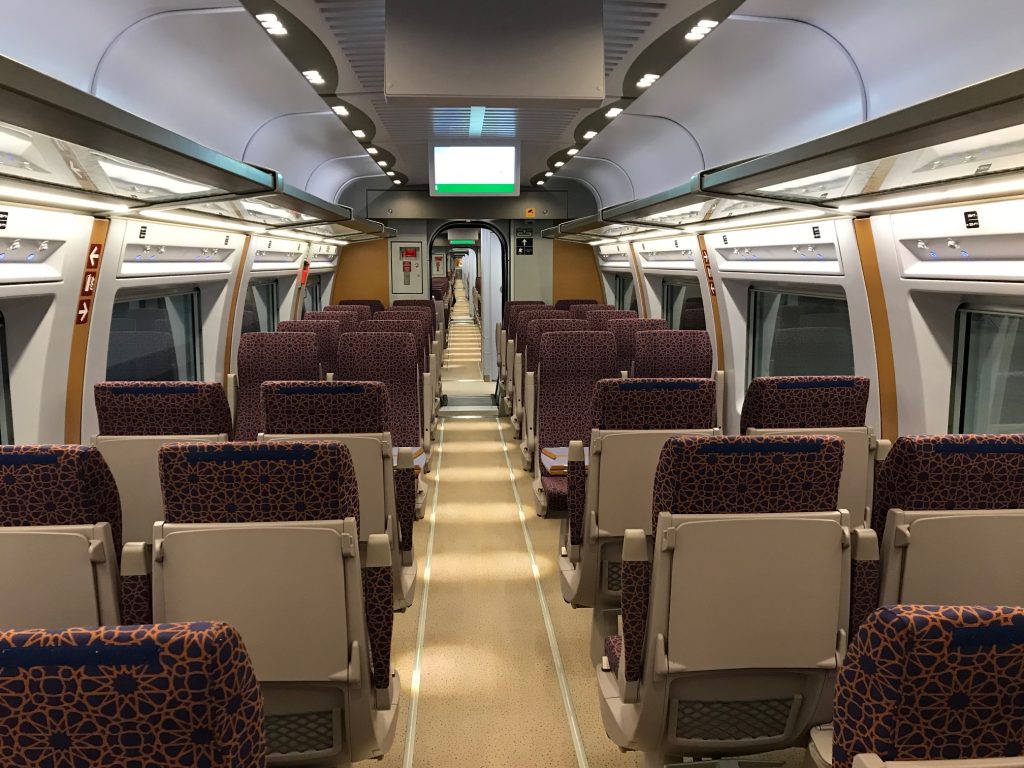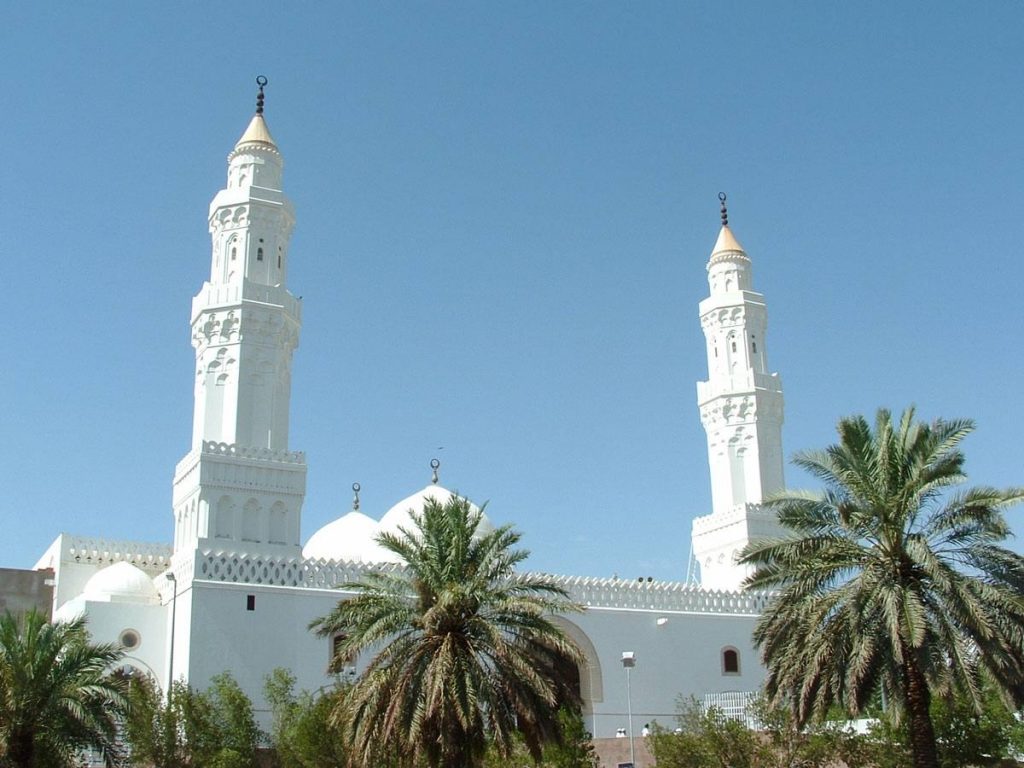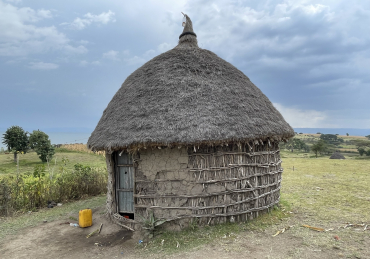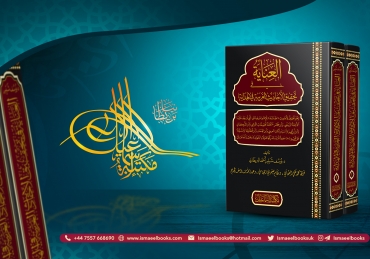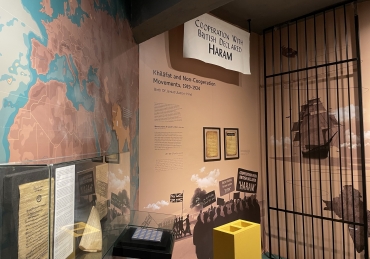In the company of Shaykh al-Islām Mufti Muhammad Taqi Usmani in al-Madinah al-Munawwarah
بسم الله الرحمن الرحیم
Introduction
Allah Almighty blessed us with a visit to the blessed cities of Makkah and Madinah in Jumādā al-Thāniyah 1440/February 2019. We departed from Manchester Airport with our three young children on Thursday 14 February and arrived into Jeddah in the evening. For the first time ever, the immigration at Jeddah Airport was very quick. In less than thirty minutes, we were on our way out. We arrived into Makkah al-Mukarramah before midnight and performed ʿUmrah. We spent a week here and it was extremely busy. During some parts of the day, it felt as though it was Ramadan or the Hajj season, this is now the norm for most of the year. The construction work was ongoing and the maṭāf (the ṭawāf area) has now expanded. There were no restrictions to access the mātāf, however, the ground floor doors of the Masjid close twenty to thirty minutes before the Adhān.
Whilst in the blessed city of Makkah, we received information that our respected and honourable Shaykh al-Islām Mufti Muhammad Taqi Usmani (b. 1362/1943) has arrived in the blessed city of Madinah and will be staying for a week. This was an unexpected blessing for us. However, we were unable to make telephone contact.
Haramain High Speed Railway
After spending a week in the blessed city of Makkah, we departed on the morning of Friday 22 February to the blessed city of Madinah. We decided to use the Haramain High Speed Railway which can be booked online: https://www.hhr.sa/sites/sro/Pages/home.aspx. The Railway Station in Makkah is a ten-minute drive from the Haram and the building is state of the art.
This was our first experience of using the train and it was highly relaxing. The journey took three hours with speeds reaching 200 km/h. The staff were very helpful at the station and there is also an on-board canteen. All luggage is screened, it is advisable to arrive 30-40 minutes before departure. There are plans to install fast food chains and other shops at the stations. The only drawback currently is that there are no trolleys at the stations, although there are workers ready to assist at a nominal cost. This hopefully will be addressed in the near future.
Meeting Mufti Taqi Usmani and Shaykh Wail Hanbali
We arrived in the blessed city of Madinah at 11am and headed to our hotel by taxi (there is also a regular bus service to the haram, which costs five riyals per passenger). A few minutes after we entered the hotel, my glance fell on Shaykh al-Islām Mufti Muhammad Taqi Usmani (b. 1362/1943) who I had last met in July 2018 in London. He was staying in the same hotel. I met him and his colleagues along with an Arab guest. Mufti Ṣāḥib introduced us to each other, he was the famous Syrian ḥanafī scholar Shaykh Muhammad Wail Hanbali, who has authored several books and is currently residing in Turkey. My respected father Mufti Shabbir Ahmad (b. 1376/1957) first met him in the early 2000s, when he visited Syria and is in regular communication with him. This was our first face to face meeting although we had communicated via the phone before. He requested me to convey greetings to my father. As it was time for Jumuʿah Salah, Mufti Ṣāḥib excused himself to head to the Masjid and Shaykh Wail parted us as he had his return flight after Jumuʿah Salah.
I noted during the introductions that Mufti Ṣāḥib used encouraging and generous words for both of us. I have also experienced this previously with Mufti Ṣāḥib on several occasions. This trait of giving the important and non-important due recognition and encouragement is a sign of humility and an example to follow.
Mufti Ṣāḥib’s Schedule
After Jumuʿah Salah, Mufti Ṣāḥib enquired if we had managed to check in and the duration of our stay. He explained that the purpose of his visit was to partake in the Shariah Board meetings of the Islamic Development Bank. His meetings were scheduled daily from 9am to Dhuhr Ṣalāh and from ʿAṣr to Maghrib Ṣalāh.
Our stay in the blessed city was for two nights. We met with Mufti Ṣāḥib before and after each Ṣalāh and benefited from his company and affection. Between Maghrib and ʿIshāʾ Ṣalāh, Mufti Ṣāḥib spends his time in al-Masjid al-Nabawī in the place of the Aṣḥāb al-Ṣuffah, entering from door number three. Despite his age and ill health a few weeks ago, Mufti Ṣāḥib engages in long Nawāfil Ṣalāh after Maghrib Ṣalāh for up to thirty minutes, followed by the recitation of the Qurʾān until ʿIshāʾ Ṣalāh. A few weeks ago, Mufti Ṣāḥib fell ill, however, al-Ḥamdulillāh, he appeared to be in good health, although he sometimes used the wheelchair until the door of the Masjid. When I suggested to Mufti Ṣāḥib that al-Ḥamdulillāh he looks well, he said, say: Mashā Allah.
Along with his family, Mufti Ṣāḥib was accompanied from Pakistan by Mufti Ahmad Afnan Ṣāḥib and his family. Mufti Ahmad Afnan is a graduate of Darul Uloom Karachi and the Director of the Faculty of Shariah at Jamiatur Rasheed in Karachi. Mufti Ṣāḥib also has a student residing in the blessed city of Madinah, Mufti Abdul Malik al-Atiq Ṣāḥib, who has authored several books in Urdu, including ‘Urdun kā Musāfir’ (The traveller to Jordan), ‘Mithālī Ustād awr Kāmiyāb Muhtamim key liye Rāhnumā Uṣūl’ (Guiding principles for an exemplary teacher and successful Principal). He provides assistance to Mufti Ṣāḥib during his stay here.
Recitation of ḥadīths near the Riyād al-Jannah
Later in the evening (on Friday) after Maghrib Salah, whilst sat near Riyad al-Jannah in the place of the Aṣḥab al-Suffah, I requested Mufti Ṣāḥib if I could read the first ḥadīth of Ṣaḥīḥ al-Bukhārī to him. He was sat on the chair reciting the Qurʾān and responded in the affirmative. I had recited ḥadīths to Mufti Ṣāḥib in the past, but saw this as an unmissable opportunity to read ḥadīths to him in close proximity to our beloved ﷺ, the leader of the mankind, to whom we are indebted forever, may peace and blessings be upon him forever.
Mufti Ṣāḥib sat on the floor whilst the ḥadīths were read. I began by reading the al-Ḥadīth al-Musalsal bi al-Awwaliyyah followed by the first ḥadīth of Ṣaḥīḥ Bukharī, a picture of which I had on my phone. Mufti Ṣaḥīb then requested I also read the final ḥadīth of Ṣaḥīḥ Bukhārī, after which he returned to his chair. I praised Allah Almighty for this blessing and quickly noted the following on a piece of a paper (it is good practice to have a paper and pen when in the company of scholars to note down their advices and gems):
بسم الله الرحمن الرحيم، قرأت الحديث الحديث المسلسل بالأولية على شيخنا المفتي العلامة محمد تقي العثماني في المسجد النبوي في مقام أصحاب الصفة بين صلاتي المغرب والعشاء في ليلة يوم السبت ٢٢ فبراير ٢٠١٩م، ثم قرأت عليه أول حديث من صحيح البخاري. ثم طلب مني شيخنا أن أقرأ آخر حديثه، ولله الحمد. وكان شيخنا جالسا على الكرسي بسبب المرض، لكن جلس على الأرض أثناء قراءتي، ثم عاد إلى كرسيه، والحمد لله أولا وآخرا، وصلى الله وسلم وبارك على نبينا محمد وآله وصحبه أجمعين.
Masjid Quba
After ʿIshāʾ Ṣalāh, Mufti Ṣāḥib decided to visit Masjid Quba as he was unable to visit on Saturday morning due to his meeting. It was the general habit of our beloved Prophet ﷺ to visit Masjid Quba every Saturday and perform Ṣalāh therein (Ṣaḥīḥ al-Bukhārī, 1193). Mufti Ṣāḥib explained that Friday night is included in Saturday as the night precedes the day in Islam, therefore if someone is unable to visit on Saturday during the day, he can visit on Friday evening.
In Masjid Quba, Mufti Ṣāḥib performed Ṣalāh a few rows behind the first row, immediately behind the second dual pillar from the right when facing the Qiblah. Later, Mufti Ṣāḥib gave us a brief tour of the Masjid and explained that the first row of the original Masjid started from the pillar where he had performed Ṣalāh and that the Masjid was later expanded. He further outlined the history of Quba and how it became the first Masjid in Islam. He highlighted the location of the house of the elderly companion Kulthūm ibn al-Hidm al-Anṣārī (d. 2/624) to the front of the Masjid. This is where the Prophet ﷺ resided for several days before he entered the blessed city of Madinah (al-Ṭabaqāt al-Kubrā, 3:467; Siyar, 1:242; al-Iṣābah, 4:462). At the time, Quba was outside al-Madinah al-Munawwarah.
Someone asked Mufti Ṣāḥib the reason for the Prophet ﷺ residing in Quba. Mufti Ṣāḥib explained that this was the planning of Allah Almighty, the people of Quba also wanted this blessing and it also gave the people of Madinah the opportunity to prepare for his arrival and welcome him. Mufti Ṣāḥib described how the Masjid looked in the 1970s. He also fondly remembered how in one of his visits in the 1970s, he spent Eid al-Fitr in the blessed city of Makkah at the residence of Mawlānā Muhammad Makki in Ajyad and saw the custom of the people of Makkah who would travel in a convoy of donkeys fully loaded with goods to the blessed city of Madinah a day before Eid.
Discourses and Jurisprudence
As Mufti Ṣāḥib walked to and from the Masjid and also whilst sat in the Masjid, people asked him questions. He would answer questions whether the questioner was known to him or otherwise. Many people would come to shake their hands with him. He would shake hands with all of them looking at them and giving them the due attention. The following is a summary of some of the discourses of Mufti Ṣāḥib which I noted:
- I mentioned to Mufti Ṣāḥib that Shaykh ʿAīi ibn ʿAbd al-Raḥmān al-Ḥudhayfī (b. 1366/1947), the Imam of al-Masjid al-Nabawi pauses after the fourth takbīr in Janāzah Ṣalāh. Mufti Ṣāḥib replied in the affirmative and said only he does this. He then mentioned the supplication after the fourth takbir which has been mentioned by some jurists: اللهم لا تَحرمنا أجره ولا تفتنا بعده. (For further reading, refer to the following: https://islamicportal.co.uk/dua-after-fourth-takbir-in-janazah-salah/).
- Someone asked regarding performing Ṣalāh in the Masjid anywhere even if there are gaps in the rows. Mufti Ṣāḥib explained that every effort should be made to go ahead and join the rows. However, if a person risks missing the Ṣalāh, for example, Janazah Ṣalāh, one can perform it wherever he is in the Masjid. I noted that Mufti Ṣāḥib would walk from the back of the Masjid to the umbrella section for each Salah to avoid the gap in the rows.
- I asked Mufti Ṣāḥib regarding a Muslim inheriting from a non-Muslim in non-Muslim countries like the UK and the flexibility given by Ḥakīm al-Ummat Mawlānā Ashraf ʿAlī Thānawī (d. 1362/1943) and Mawlānā Ẓafar Aḥmad ʿUthmānī (d. 1394/1974) among others. Mufti Ṣāḥib suggested to show him the Fatwa as he was unaware of this. He added that some companions have permitted it based on the dominance of Islam (الإسلام يعلو ولا يعلى). I suggested that that this minority view is shared by Shaykh al-Islam Ibn Taymiyyah (d. 728/1328), Ḥāfiẓ Ibn al-Qayyim (d. 751/1350) and Shaykh Yūsuf al-Qarāḍāwī (b. 1345/1926). Mufti Ṣāḥib queried whether any basis is mentioned in Imdād al-Aḥkām. I mentioned the two principal points mentioned in the Fatwa; the minority view and the concept of Istiʿlā of a non-Muslim. Later I read out the Fatwa to him from Imdād al-Aḥkām. Mufti Ṣāḥib explained that his entitlement is not due to inheritance, rather the application of the law of the land. He said something to this effect: حکومت اپنے قانون کے مطابق دے رہی ہے، یہ بطور میراث نہیں ہے، بلکہ قانون کا لزوم ہے He further cited the unanimous ruling that the wealth of a ḥarbī is lawful with his consent (مال الحربي حلال برضاه). In short, Mufti Ṣāḥib explained that the basis for the flexibility is not the laws of inheritance and the minority view therein, rather the application of the local law of the land. Further, he agreed with the suggestion that it would be better for the non-Muslim to make a waṣiyyah (bequest) for the Muslim, because it is permissible for a non-Muslim to make a will for a Muslim (For further reading on this matter, refer to the following link: https://islamicportal.co.uk/can-a-muslim-inherit-or-bequeath-from-a-non-muslim/).
- Whilst discussing the inheritance issue, Mufti Ṣāḥib critiqued those who condone marriages with non-Muslims in western countries.
- Someone asked Mufti Ṣāḥib regarding the ruling of saying Jumuʿah Mubārak. Mufti Ṣāḥib prepared an audio recording which was circulated on social media. In summary, it is permissible to say it as long as it is not regarded Sunnah, and there is no iltizām (it is not expected or considered necessary) in the way that there is iltizām of Sunnah actions.
- I asked Mufti Ṣāḥib regarding a menstruating woman entering the compound of al-Masjid al-Aqsa because the entire compound is part of the Masjid, not just the buildings therein. Mufti Ṣāḥib agreed that a menstruating woman cannot enter the compound. In relation to the suggestion that the compound is the ḥaram of al-Aqsa and the Masjid is only the building at the front of the compound, Mufti Ṣāḥib commented that this is not correct. It is not ḥaram as the rules of ḥaram do not apply (they only apply in Makkah and Madīnah). I suggested that this is a common misconception and the use of ḥaram for Masjid al-Aqsa is recent and not found in the works of earlier scholars. Perhaps, it begun because of its iḥtirām (sanctity), however, the term ḥaram is a technical and jurisprudential term with rules and regulations attached to it.
- I asked Mufti Ṣāḥib regarding performing Ṣalāh in front of the Imam as it occurs here. Mufti Ṣāḥib said that this is a big problem, there is only flexibility in the Mālikī school of thought. Unfortunately, there is no consideration for the other schools even in non-busy periods. In previous times, the Imams and management would give due regard to the views of all four schools of thought in so far as possible. In relation to the Mālikī position, he explained that he has only found one athar (narration) of a companion.
- Mufti Ṣāḥib gave another example of the lack of regard for the views of the four schools, Jumuʿah Ṣalāh before Zawāl which is permitted in the ḥanbalī school of thought. He explained that he wrote to the Grand Mufti, the Head of the Imams of Haramayn and the Minister for Religious Affairs in relation to this.
- I said that when performing Tawaf, there are so many women particularly from the Indian Sub-Continent who attempt to come close to the Kaʿbah with pushing and intermingling. Mufti Ṣāḥib commented that this is indeed very inappropriate adding that many are not properly dressed.
- I asked Mufti Ṣāḥib regarding the preferred timing for the evening Adhkār, he replied: after Maghrib Ṣalāh.
- I asked Mufti Ṣāḥib regarding combining prayers in ʿArafah and whether it would be permissible according to Imam Abū Ḥanīfah (d. 150/767) if multiple congregations were organised with the permission of the Imam due to the large numbers of people. I suggested that some scholars like Imam Abū Bakr al-Jaṣṣāṣ al-Rāzī (d. 370/981) have mentioned the notion of ‘the permission of the Imam’ in relation to this issue and also made a comparison with Jumuʿah Ṣalāh. Mufti Ṣāḥib suggested that this is worth looking into. I informed him that I have gathered some material in relation to this. He requested a copy which I gave to him later.
- A person asked regarding a menstruating woman who is travelling with a group from Madinah to Pakistan via a one day stop in Makkah for ʿUmrah, what should she do? Mufti Ṣāḥib responded that she should travel from Madinah to Jeddah and reside there and not travel to Makkah. He further explained that ʿUmrah is not necessary and therefore there is no need to enter into Ihram and commit such a major sin of performing Tawaf in menses. If the situation does not permit her to reside in Jeddah, then due to the extreme circumstance, she should not enter into Iḥrām at all and give a Dam (sacrifice of a goat or equivalent animal in ḥaram) for crossing mīqāt without Iḥrām. He was further asked that once she travels to Jeddah, can she travel to Makkah without iḥrām? He said, yes, if Jeddah was maqṣūd (intended as her primary destination). (For further reading in relation to this, visit this link: https://islamicportal.co.uk/crossing-miqat-without-ihram/).
- I asked Mufti Ṣāḥib regarding a specific scenario of a person who crosses mīqāt and travels to Makkah without entering into Iḥrām at all and returns home without having entered into Iḥrām. If he does not return to mīqāt and does not perform Hajj or Umrah thereafter, is he liable to give Dam considering he has not entered Iḥrām at all? Mufti Ṣāḥib answered in the affirmative that Dam will be necessary and will only be cancelled if he returns to mīqāt and enters into Iḥrām (refer to the link above for further reading).
- I asked Mufti Ṣāḥib regarding the sale of pet food which contains animals not slaughtered by Muslims. Mufti Ṣāḥib explained that one cannot trade in such commodities because an animal slaughtered by a those who are not Muslim (or Ahl al-Kitāb) is maytah (carrion). If the pet food is placed somewhere and an animal eats it on his own accord, this is a separate matter.
- I asked Mufti Ṣāḥib whether he makes any particular supplication when drinking Zamzam. He replied, no, I read whatever comes to the mind at that moment. (I recollected the supplication of Ḥāfiẓ Ibn Ḥajar al-ʿAsqalānī (d. 852/1449) to reach the status of Ḥāfiẓ Shams al-Dīn al-Dhahabī (d. 748/1348) and the supplication of ʿAllāmah Ibn al-Humām (d. 861/1457) for steadfastness and death upon Islam, when they drank Zamzam).
- Mufti Ṣāḥib asked Mufti Ahmad Afnan Ṣāḥib and myself a particular question that was on his mind since a few days. The majority of Sūrah al-Muzzammil was one of the earliest chapters to have been revealed, and there is an instruction therein to the Prophet ﷺ to stand in the night prayer for one third of the night or more and to recite the Qurʾān. So, what would the Prophet ﷺ recite considering only two or three Surahs had been revealed thus far? I checked some books and later shared my limited findings with Mufti Ṣāḥib. First, ʿAllāmah Abū ʿAbd Allah al-Qurṭubī (d. 671/1273) is firmly of the view that the entire Surah was revealed in Madinah. There are some narrations that support this view. However, their chains have been critiqued by Ḥafiẓ Ibn Kathīr (d. 774/1373) and others, and the view of the vast majority of scholars is that the majority of the Sūrah was among the first to be revealed. Second, I was unable to find any reference to this question in any of the tafsīr books except in the tafsīr of ʿAllāmah Ibn ʿĀshūr ( 1393/1973) who addresses it partially. He explains that the instruction to recite the Qurʾān is a general instruction, not particular to Qiyām al-Layl in the preceding verse. He adds his reasoning that only a few chapters of the Qurʾān were revealed by then. Third, perhaps the Prophet ﷺ would recite what has been revealed thus far and repeat it. It is mentioned in the narration of Sunan al-Tirmidhī (448) that the Prophet ﷺ repeated once verse throughout his Qiyām al-Layl. Mufti Ṣāḥib suggested this was not the regular Prophetic practice. Pondering upon it later, perhaps the Prophet ﷺ would recite what has been revealed thus far and repeat it, or he would stand in contemplation which perhaps can be deduced from what ʿAllāmah Ibn ʿĀshūr has mentioned, similar to his worship prior to Prophethood. And Allah alone knows best.
Such discussions are one of the greatest advantages of spending time with Mufti Ṣāḥib particularly during his journeys. Mufti Ṣāḥib is an ocean of knowledge with a profound insight into all the Islamic sciences. A few moments with Mufti Ṣāḥib provide a person with invaluable gems and priceless pearls.
Meeting with scholars
On Saturday 23 February, Shaykh ʿĀmir Bahjat came to visit Mufti Ṣāḥib in the Masjid after Maghrib Ṣalāh. Shaykh ʿĀmir is a young scholar who has authored several books and is a master of Arabic poetry. I had previously heard Mufakkir al-Ummah Ḥaḍrat Mawlānā ʿAbdullāh Kāpodrawī Ṣāḥib (d. 1439/2018) praise him and mention that he recited the famous Rasm al-Muftī of the ḥanafi scholar ʿAllāmah Ibn ʿĀbidīn (d. 1252/1836) to him from memory. Shaykh ʿĀmir has authored a similar Rasm al-Muftī for the ḥanbalī school along with a beautiful collection of poems on the various Islamic measurements with their modern-day calculations in grams and liters, all within the couplets. Shaykh ʿĀmir gifted his book comprising of these poems to Mufti Ṣāḥib and also requested him to write a foreword to one of his books on Fiqh al-Nawāzil.
Later, after ʿIshāʾ Ṣalāh, the prominent Indian scholar Mawlana Khalil al-Raḥmān Sajjād Nuʿmanī came to meet Mufti Ṣāḥib at the hotel. We were also fortunate to meet him.
Balkans and visit to the UK
During our stay, Mufti Ṣāḥib fondly recollected our trip to the Balkans last year, commenting that that the scenery in Montenegro was something else. He further mentioned that Mawlana Hanif Dudhwala has emailed me regarding publishing my travelogue (in Urdu) and also your travelogue (in English). (These books will be published soon Inshā Allah).
I invited Mufti Ṣāḥib for the completion of Ṣaḥīḥ al-Bukhārī at Darul Uloom Blackburn. Mufti Ṣāḥib said it will be difficult to visit the UK before Ramaḍān due to other commitments. However, he accepted our invitation when he visits after Ramaḍān Inshā Allah.
Publications
Before bidding farewell to Mufti Ṣāḥib, I asked him regarding the Hadith Encyclopaedia (al-Mudawwanah) he is leading on. He explained that the second volume is currently in print and the third and fourth volumes are also ready and will be sent to print, adding that people will appreciate and understand the work better once these volumes are published.
In relation to the subsequent volumes of Fiqh al-Buyūʿ, Mufti Ṣāḥib is currently working on duyūn (debts) focusing on the chapters of Kafālah, Ḥawālah and related chapters.
Character and Adab
Undoubtedly, Mufti Ṣāḥib is among the world’s leading scholars. From his knowledge to his piety and all-roundedness, from his contribution to his humility and balance, there are many unique aspects of Mufti Ṣāḥib. If there are two words that describe Mufti Ṣāḥib’s personality, it is Adab (etiquette) and Khuluq (character). Mufti Ṣāḥib is an embodiment of etiquette and good character. Whether it is Adab of the ḥadīths as exemplified by sitting down to listen to the ḥadīths, or the Adab of the people as exemplified by meeting and greeting everyone with full attention and responding to their queries wholeheartedly, or Adab al-Khilāf (disagreement) and the compassion and affection shown to others, Mufti Ṣāḥib is a shining example of these traits.
Importance of native language
Mufti Ṣāḥib’s affection towards children is also worth a mention. On one occasion in the lift, he spoke to my Muhammad and then asked, whether he understands Urdu? I replied that he understands Gujarati and that I only speak to him in Gujarati. When he speaks Gujarati, some of his cousins remark: what language is he speaking in? with an expression on their face as though he is speaking in some alien language. Mufti Ṣāḥib commented that this is also a problem in Pakistan. In a local shop, a young child would just not understand the shopkeeper’s remark, “Bees Roopey” until the shopkeeper said twenty rupees. I recollected a profound statement of Shaykh Abū al-Ḥasan ʿAlī al-Nadwī (d. 1420/1999) in this regard which I have heard my respected father Mufti Shabbīr Aḥmad (b. 1376/1957) quote regularly, “those who lose their native language also lose their culture”.
Farewell
The time had finally come on Sunday 24 February after ʿAṣr Ṣalāh to bid farewell to Mufti Ṣāḥib. Mufti Ṣāḥib requested to convey Salam to my respected father, Mufti Abdussamad Ṣāḥib, our Principal and to our colleagues.
We conveyed our departing Salāms to our beloved Prophet ﷺ in the end, and departed shortly before Maghrib Ṣalāh for Jeddah Airport and returned home the following morning.
May Allah Almighty grant us the true love of our beloved Prophet ﷺ enable us and grant us the ability to benefit from Shaykh al-Islām Mufti Muhammad Taqi Usmani and lengthen his shadow over us with ʿĀfiyah. May Allah Almighty grant us the tawfīq to regularly visit Haramayn and al-Masjid al-Aqsa and grant us death upon Islam.
Yusuf Shabbir
29 Jumādā al-Thāniyah 1440 / 5 March 2019

